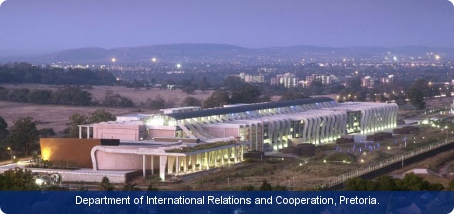Government
- Overview
- History

South Africa is a republic with an executive president. The constitution of 1997 provides for a federal state, a bill of rights, universal adult suffrage, regular multi-party elections and recognition of traditional leaders, languages and institutions supporting human rights.
The president is both head of state and government. The president is elected by the National Assembly and can serve a maximum of two five-year terms. The deputy president and cabinet are appointed by the president.
The bicameral parliament consists of the National Assembly and the National Council of Provinces. The National Assembly has 400 seats elected by popular vote for five years, under a system of proportional representation. The National Council of Provinces has 90 seats, with 10 members elected for five years by each of the nine provincial legislatures. Half of the members of the National Assembly are chosen from nationwide party lists, the other half from party lists for each province.
The legal system is based on Roman-Dutch law. The judicial system comprises the Supreme Court of Appeal, the High Court and the magistrates’ courts.
The Supreme Court of Appeal, in Bloemfontein, is presided over by a president, and is supreme in all matters except those relating to the constitution, which together with human rights cases are the responsibility of the Constitutional Court, in Johannesburg. Judges are appointed by the president of the republic with the advice of the Judicial Service Commission.

The first European settlers in South Africa were Dutch farmers, who arrived in the Cape in the middle of the seventeenth century. After 1814, control of the Cape passed into British hands. Tensions between the Boers and the British resulted in a number of conflicts, culminating in the Second Boer War of 1899-1902. South Africa’s independence from British control was formally recognised by Britain under the Statute of Westminster in 1931.
In 1912, the African National Congress (ANC) was founded to fight for full constitutional rights for black people. However, the government steadily reduced black rights. In 1948, the National Party (NP) came to power on an electoral platform of apartheid, and moved rapidly in enacting a policy of racial segregation. In 1960 the ANC was banned and in 1964 Nelson Mandela was arrested and imprisoned. In 1961 South Africa withdrew from the Commonwealth.
From the mid-1980s, the Commonwealth, the USA and European powers introduced political and other sanctions against South Africa. After prolonged internal struggle, in 1990 the ban on the ANC was lifted, the apartheid laws were repealed and Mandela was released. South Africa’s first non-racial and democratic elections were held in 1994, and Nelson Mandela, president of the ANC, was elected president in the same year. Although the ANC had an overall majority, in the interests of achieving consensus a coalition government was formed. Mandela remained president until 1999 and was replaced by Thabo Mbeki.
In December 2007, Jacob Zuma defeated President Thabo Mbeki in the ANC leadership elections.
Facing the challenge of the Congress of the People (COPE) and the Democratic Alliance, the ANC nevertheless won 66% of the vote in the parliamentary elections in April 2009. At the first sitting of the National Assembly in May 2009, Zuma was formally elected president.





